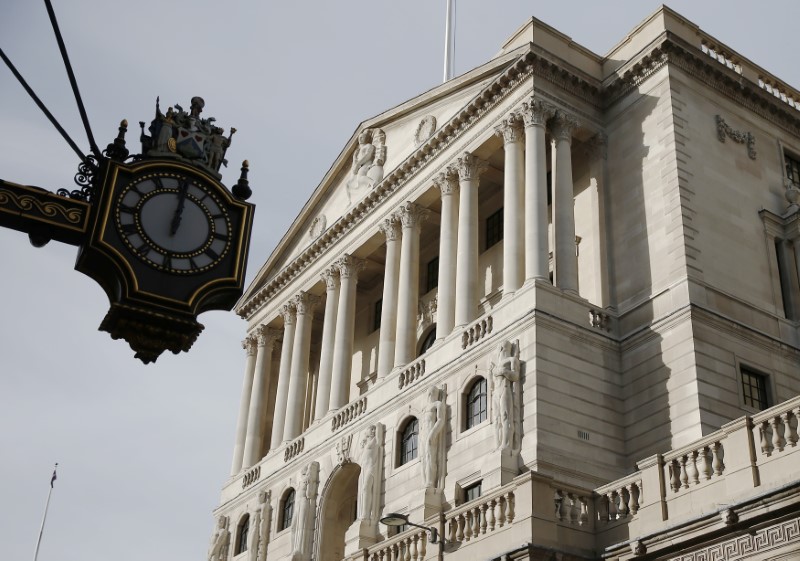By Andy Bruce and David Milliken
LONDON, (Reuters) - Sterling's strong performance over the past month suggests inflation may overshoot the Bank of England's target by less than it forecast in November, the central bank said on Thursday.
BoE policymakers agreed unanimously to keep interest rates on hold at a record low 0.25 percent and left plans for government and corporate bond purchases unchanged after their December policy meeting, as economists polled by Reuters had expected.
Last month Bank policymakers dropped their plan for another interest rate cut and instead adopted a neutral stance for policy, after Britain's economy suffered much less immediate damage from June's Brexit vote than early data had suggested.
Sterling has appreciated by over 6 percent on a trade-weighted basis since the BoE's last set of forecasts published on Nov. 3.
"(This) would by itself point to less of an overshoot in inflation relative to the target in the medium term, though month-to-month volatility was to be expected as market participants' views on the United Kingdom's future relationship with the European Union continued to evolve," the BoE said.
On Wednesday the U.S. Federal Reserve raised its main interest rate by 0.25 percentage points to a target range of 0.5-0.75 percent, as expected, tightening policy for only the second time in a decade.
Some economists say the BoE would likely be following suit, were it not for uncertainty created by EU exit talks due to start early next year.
BoE policymakers said there had been little news over the last month about Britain's economy. The global economy had strengthened, but so too had the risks facing it.
"The global outlook has become more fragile, with risks in China, the euro area and some emerging markets, and an increase in policy uncertainty," the BoE said.
Expectations of looser fiscal policy after the election of Donald Trump as U.S. President had pushed up long-term bond yields, the BoE said.
British inflation hit its highest rate in more than two years last month, though at 1.2 percent it still remains below the BoE's 2 percent target. Average prices were pushed up by more expensive clothing and the impact of June's Brexit vote on the prices consumers paid for technology goods.
In October, inflation dipped to 0.9 percent, requiring BoE Governor Mark Carney to write a letter to finance minister Philip Hammond, which the BoE published on Thursday.
"The MPC remains committed, as always, to taking whatever action is needed to ensure that inflation expectations remain well anchored, and that inflation returns to the target in a sustainable fashion and over an appropriate horizon," Carney said.
Hammond said the government had "absolute" commitment to the central bank's operational independence and inflation targeting.
The BoE forecast last month that inflation would surge to about 2.7 percent by this time next year, as sterling's plunge after Britain's vote to leave the EU pushes up the cost of imports and squeezes living standards and household spending.
Sterling is currently down about 15 percent against the U.S. dollar and 8 percent against the euro since the June 23 referendum, making suppliers and retailers battle for profits as imported goods become more expensive.
Crude oil prices hit their highest since mid-2015 this week after OPEC members and some of their rivals reached the first deal since 2001 to jointly reduce output to tackle global oversupply and boost prices.
Business surveys suggest Britain's economy has continued to grow robustly going into 2017, and labor market data released on Wednesday was mostly strong, despite employment falling for the first time in over a year.
The BoE said on Thursday that it was possible that pay growth might respond more to higher inflation than it had done in the past now that unemployment was back to its pre-financial crisis lows.

Last month the BoE bumped up its forecast for economic growth in 2017 to 1.4 percent from 0.8 percent previously, though this would still be the weakest growth in five years and below a rate of 2.2 percent penciled in for 2016.
Carney has repeatedly said the BoE could tolerate some overshoot to its 2 percent inflation target, while warning that there are limits to this.
Last week he reiterated that higher inflation would squeeze household spending, a key driver of the economy, resulting in slower-than-average growth over the next few years.